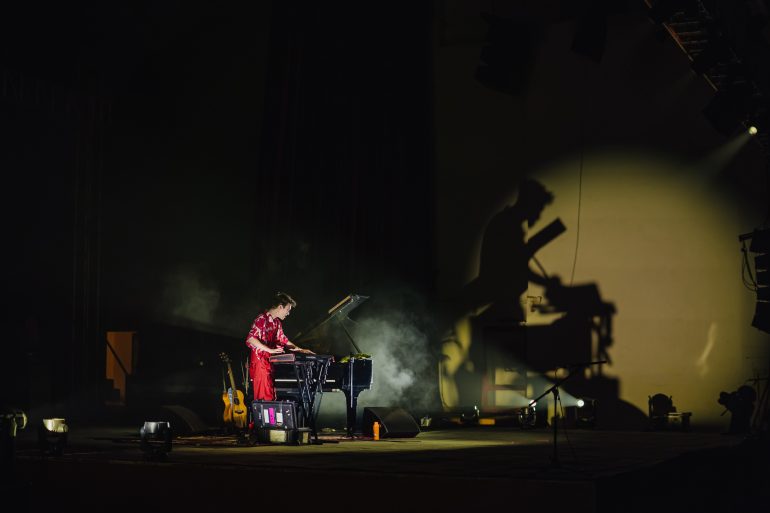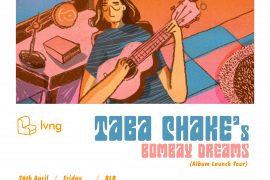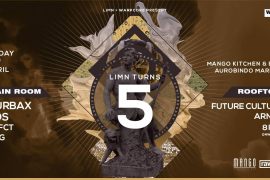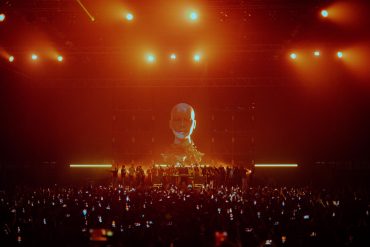Music fans will have to make tough choices this weekend. They have to pick between two long-running and much-loved festivals, the Bacardi NH7 Weekender in Pune and Echoes of Earth in Bengaluru. Those in Mumbai have to also decide between travelling to nearby Pune or staying in the city to catch Snarky Puppy on Saturday and Tinariwen on Sunday.
It’s a situation gig goers have repeatedly had to deal with throughout this festival season. In the first weekend of November, for example, Bollywood Music Project, Mahindra Independence Rock, Kygo’s Palm Tree Music Festival took place simultaneously in Mumbai, which was also supposed to host the inaugural edition of the subsequently cancelled SPXCEJXM festival those two days.
The dilemmas aren’t restricted to just festivals but several large-format concerts and artist tours as well. This Friday, Pune residents have to choose whether they want to make it for Weekender, Jasleen Royal or Paradox and those in Bengaluru if they want to go for Echoes, Jai Wolf or The Yellow Dairy. Next weekend, folks in the garden city can rock with Steve Vai at the LiveBox Festival or bop to Black Coffee. Such clashes are becoming increasingly common and there are several more over the next two months. “Whenever promoters reach out to me, the first question is not ‘Is X available on this date?’, it’s, ‘Is X playing festival Y? If they’re not, then we can have a conversation’,” says Yama Seth, the head of talent at Skillbox’s management agency Level House whose roster includes acts such as Parvaaz and Raman Negi. “
A seven-month festival season
Film producers often talk about how there are only 52 Fridays in a year and therefore, clashes between some big-budget movies are inevitable. For festival promoters, that number is almost halved with the season for outdoor events spanning only seven months from September to March because it’s too hot or too wet during the rest of the year. Within that window, certain weekends are further eliminated if, for instance, they include a dry day or fall on holidays such as Dussehra, Diwali and Christmas when people tend to stay at home for family gatherings.
If the shows aimed at a more mainstream crowd, such as those centred around food or drink where music is an additional but integral attraction, like Zomaland or India Cocktail Week, then the dates have to be worked around other events that attract mass viewership. For instance, while planning the ongoing run of Coca-Cola What’s Cooking series in Delhi and Kolkata, the organisers took into consideration the dates of important Cricket World Cup matches such as the India-Pakistan bout and the final, said Tej Brar, the head of festivals at NODWIN Gaming, which put together the series for the brand and whose IPs include the Bacardi NH7 Weekender.
Other factors include “brand mandates and whether there’s somebody from upper or global management visiting during that time or if there’s an artist we really want who’s only available only during that period.” Brar believes that festival clashes “are a lovely problem to have” as “as a consumer”. He says, “We used to have the opposite problem where it was a monumental task to even put something together that was attractive to the alternative community, people looking for [things] outside of mainstream entertainment.”
Limited resources
The majority of the audience for such events ranges from college students to young professionals under the age of 35, for whom the escalating price of festival and concert tickets has been putting a strain on their monthly budgets, especially if they have to additionally spend on travel and accommodation. “I get tons of emails and DMs [from fans] about how they only have ‘x’ amount of money to spend on a weekend,” says Seth. “If they’re based in Mumbai where two festivals are happening over the same weekend, and they want to go to one on a Saturday and the other on a Sunday, buying tickets for two major festivals is something that’s taking a financial toll.”
On the supply side, with most festivals demanding a period of exclusivity from the performers, clashes result in scrambling to book in-demand acts as soon as possible as well as locking in vendors for stage construction, light and sound earlier than ever before. “It’s now becoming exceedingly important to send in offers ahead of schedule, which means we’re working much earlier in the year than we would have been,” says Brar.
With vendors, because there’s such a small list of trusted names, “this is becoming a larger problem as time goes on”, he says. Not only do promoters need to ensure that they’ve got their dates, they also need to alert them about the scale of the production and the kind of inventory required. “It really helps if you’re working with vendors you have long-term relationships with, and who look forward to your show in the calendar.”
The debate around exclusivity clauses
While vendors can work on multiple competing events simultaneously if they have the manpower and equipment, the most contentious fallout of festival clashes are exclusivity clauses for artists, as per which they cannot perform at any other events or venues across the host state. The time frames have ranged from as little as two weeks before and two weeks after the festival, to as long as three months before and 90 days after. Seth feels that such stipulations in contracts are often “lifted from the west in a very direct manner without really contextualising them for Indian artists”.
She says, “While in the US, you could have east coast-west coast exclusivity, India is a very small gig economy [and] for independent artists, the largest source of revenue is still live shows. The compensation does not always reflect that kind of exclusivity. If you’re paying me three times the money and you want me to sit it out [of a particular state for so long], I understand.” It’s important to note however that the relative value of the offer varies depending on the stature of the act, and for acts who don’t command large stand-alone fees, the maths might make sense.
A reasonable ask would be a month prior and 15 days post the festival, according to Seth. “That’s anyway the benchmark I keep for my artists to not make an overkill of their set,” she says. On the other hand, Brar believes that for upcoming Indian artists, exclusivity periods that fall within a three-month period are justified. “The way I think about it is, playing an NH7 with a great audience of 2,000 to 3,000 people is more valuable and makes more of a splash than playing three club gigs across the season with 200 or 300 people in attendance,” he says.
On their part, artists are making peace with the fact that they’ve occasionally got to sacrifice playing one festival for another. “It was a little frustrating, of course,” says singer-songwriter and electronic music producer Tarana Marwah, who performs as Komorebi and counts the Ziro Festival of Music in Arunachal Pradesh, Royal Enfield’s Motoverse in Goa, and Lollapalooza India in Mumbai as the festivals she’s been booked for this year. “You spend years working on an album, you want to play your music in different cities, and build a fan base. At the same time, they’re trying to get people to come to their event.”
Fortunately, festival organisers are often open to reducing the duration and the extent of the exclusivity. Last year, for instance, Seth was able to make Mahindra Independence Rock waive their state-wise restriction for Parvaaz to play the Parx Music Fiesta in Thane after they agreed that there would be little overlap in the audiences. Similarly, Marwah’s management got a festival team to reduce the mandate, to enable her to at least play club venues soon after it concludes. Expectedly, the balance of power is tilted in favour of the organiser in the case of newer acts. “My concern is, what happens to an artist who’s not got a manager or who’s got a manager who’s young and new in the business? How do they negotiate this?,” says Seth.
Saved dates
Brar agrees that there should be more consultation between promoters, producers and booking agents to avoid events clashing because “obviously that’s something that doesn’t help anybody’s case”. An ideal solution would be if they privately shared their dates with each other, a practice that was in place at least at the club show level, about a decade ago when the live music scene was at a much more nascent stage. “Now, the industry’s way bigger so it’s much harder to coordinate,” says Brar.
Then again, a lot of festivals are following the way of the west by reserving specific weekends. For instance, the Ziro Festival of Music takes place during the last week of September; Mahindra Independence Rock in the first weekend of November; Echoes of Earth, Magnetic Fields and Sunburn in the first, third and last weekend of December; Lollapalooza in the last weekend of January; Mahindra Blues in the second weekend of February; and Vh1 Supersonic in the third or fourth weekend of that month. But even those may have to be moved around if the said weekend includes dry days, family-oriented holidays, or previously unforeseen events like elections.
With new festivals being mounted every year, the number of clashes is likely to rise over the next few years. “This is just the beginning,” Brar says. “In ten years, there are going to be 15 to 20 players, at least, I hope, who are putting on big-format stuff across the country. I think our population is big enough to sustain it. There’s enough interest in the market [and] there’s going to be enough spending power.”
Marwah sees the intensity of all the action as a motivating force. “In an ideal world, if everything was spaced out, we would get more coverage but at the same time, isn’t it such an amazing thing that we have so many festivals to play?,” she says. “On top of that, there are so many artists to book now. There’s healthy competition and an energy there that I like. It inspires me to keep pushing myself.”
A calendar of upcoming clashes
Friday, December 1
Pune
Bacardi NH7 Weekender
Hubris
Jasleen Royal
Paradox
Bengaluru
Jai Wolf
The Yellow Diary
Saturday, December 2
Mumbai/Pune
Bacardi NH7 Weekender, Pune
India Cocktail Week, Mumbai
Snarky Puppy, Mumbai
Bengaluru
Echoes of Earth
Zaeden
Sunday, December 3
Mumbai/Pune
Bacardi NH7 Weekender, Pune
India Cocktail Week, Mumbai
Tinariwen, Mumbai
Bengaluru
Echoes of Earth
Hubris
NCR
King, Delhi
Snarky Puppy, Gurugram
Goa
Jai Wolf
When Chai Met Toast
Friday, December 8
Bengaluru
LiveBox Festival/Steve Vai
Black Coffee
Saturday, December 9
Mumbai
Mumbai Jazz Festival
Sneakin Out
Black Coffee
Jitwam
Indore
Euphoria
Harrdy Sandhu
Kolkata
Jasleen Royal
Steve Vai
Sunday, December 10
Mumbai
Mumbai Jazz Festival
Jasleen Royal
NCR
Black Coffee, Gurugram
Space Day, Delhi
Friday, December 15
Bengaluru
Bloom In Green, Krishnagiri
Euphoria
Mali
Saturday, December 16
Bengaluru
Bandland
Bloom In Green, Krishnagiri
Hyderabad
Sneakin Out
Anuv Jain
When Chai Met Toast
Pune
Hozho
Lifafa
Saturday, December 17
Bengaluru
Bandland
Bloom In Green, Krishnagiri
OnePlus AI Music Festival/Afrojack
Friday, December 22
NCR
North East Festival, Delhi
Euphoria, Gurugram
Lifafa, Gurugram
Sunday, December 24
Mumbai
A Day of sLick!
King
Lucky Ali
Thursday, December 28 to Saturday, December 30
Goa
Satellite Beachside (starts on Wednesday, December 27)
Sunburn (end on Sunday, December 31)
Friday, December 29
Goa
King
Piyush Mishra’s Balliraamaan
Saturday, January 27 and Sunday, January 28
Mumbai
Kala Ghoda Arts Festival
Lollapalooza India
Saturday, February 10 and Sunday, February 11
Mumbai
Mahindra Blues Festival
Zomaland




